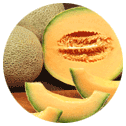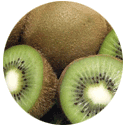Nectarine Health Benefits And Nutrition Values
The botanical name of the nectarine is P. persica var. nucipersica.Nectarines and peaches are similar in appearance and color as they differ only by a single gene, the gene for skin texture. Peaches are fuzzy and dull, while nectarines are shiny and smooth.The stones and kernels of two fruits are alike in appearance. Nectarines have red, yellow, or white flesh and are a source of vitamins A and C. They are commonly eaten fresh, or cooked in conserves, jams, and pies.As in peaches, there are freestone nectarines.When some peaches are crossed or self-pollinated, the resulting seeds that carry the factor for smooth skin may give rise to nectarines, while those that do not carry this factor will be peaches.

Nutrient |
Amounts/Selected Serving |
DV% |
|---|---|---|
Calcium |
8.6mg |
1% |
Iron |
0.4mg |
2% |
Magnesium |
12.9gm |
3% |
Phosphorus |
37.2mg |
4% |
Potassium |
287m
|
8% |
Sodium |
0.0mg |
0% |
Zinc |
0.2mg |
2% |
Copper |
0.1mg |
6% |
Manganese |
0.1mg |
4% |
Selenium |
0.0mcg |
0% |
Fluoride |
~ |
Nutrients |
Amounts/Selected Serving |
DV% |
|---|---|---|
TotalCalories |
62.9(263 kJ)
|
6% |
Carbs |
54.0(226 kJ) |
|
Fat |
3.8(15.9 kJ)
|
|
Protein |
5.1(21.4 kJ) |
|
Alcohol |
0.0(0.0 kJ) |
Nutrients |
Amounts/Selected Serving |
DV% |
|---|---|---|
Protein |
1.5g |
3% |
Nutrients |
Amounts/Selected Serving |
DV% |
|---|---|---|
Fat |
0.5g |
1% |
Saturated Fat |
0.0g |
0% |
Monounsaturated fat |
0.1g
|
|
Polysaturated Fat |
0.2 g |
|
| trans fatty acids |
~ |
|
transmonoenoicfattyacids |
~ |
|
trans-polyenoicfattyacids |
~ |
|
Omega-3 fatty acids |
2.9mg
|
|
Omega-6 fatty acids |
159mg
|
Nutrient |
Amounts/Selected Serving |
DV% |
|---|---|---|
Vitamin A |
475 IU |
9% |
Vitamin B6 |
60.0mg |
2% |
Vitamin B12 |
120.0 mcg |
0% |
Vitamin C |
7.7 mg |
13% |
`Vitamin D |
~ |
~ |
Vitamin D3 |
0.0mg |
|
Vitamin E |
1.1 mg |
6% |
Vitamin K |
3.1 mcg
|
4% |
Thiamin |
0.0 mg |
3% |
Riboflavin |
0.0mg |
2% |
Niacin |
1.6 mg |
8% |
Pantothenic |
0.3 mg |
3% |
Choline |
8.9 mg |
|
Betaine |
0.3 mg |
|
Folate |
7.2 mcg |
2% |
Nutrients |
Amounts/Selected Serving |
DV% |
|---|---|---|
carbohydrates |
15.1g
|
5% |
Dietary Fiber |
2.4g |
10% |
Starch |
0.1g |
|
Sugars |
11.3g |
Nutrients |
Amounts/Selected Serving |
DV% |
|---|---|---|
Cholesterol |
0.0mg |
0% |
Phytosterols |
~ |
~ |
Nutrients |
Amounts/Selected Serving |
DV% |
|---|---|---|
Alcohol |
0.0g |
|
Water |
125g |
|
Ash |
0.7 |
|
Caffeine |
0.0mg |
|
Theobromine |
0.0mg |
- CANCER
- STROKE
- NIGHT BLINDNESS
The antioxidants in the nectarine, including vitamin A, vitamin C and beta carotene, may protect you against cancer. Antioxidants protect cells from oxidation by free radicals. Antioxidants minimize and prevent cell damage, which may slow or prevent cancer.
It has been found that an association between diets low in potassium and increased risk of stroke. People who take potassium supplements have been reported to have a low risk of suffering a stroke. Others have found an association between increased risk of stroke and the combination of low dietary potassium plus high salt intake. Increasing dietary potassium has lowered blood pressure in humans, which by itself should reduce the risk of stroke; however, some of the protective effect of potassium appears to extend beyond its ability to lower blood pressure. Maintaining a high potassium intake is best achieved by eating nectarine.
Night blindness can be an early sign of vitamin A deficiency. Low intake beta-carotene, may contribute to a vitamin A deficiency. However, beta-carotene is less effective at correcting vitamin A deficiency than is vitamin A itself, as it is less well absorbed and is only slowly converted by the body into vitamin A. this can be achieved by nectarine fruit
- MACULAR DEGENERATION
- KIDNEY STONES
- BRONCHITIS
- CONGESTIVE HEART FAILURE
- ASTHMA
Eating a diet rich fruit called nectarine raises blood levels of antioxidants. People with high blood levels of antioxidants have a lower risk of macular degeneration. Those with the highest levels of the antioxidants selenium, vitamin C, and vitamin E may have a 70% lower risk of developing macular degeneration, compared with individuals with the lowest levels of these nutrients People, who eat nectarine high in beta-carotene, an antioxidant, are also at low risk.
Potassium helps in reduction of urinary calcium excretion, and people who eat high amounts of dietary potassium appear to low risk of forming kidney stones. Most kidney stone uses the form of the element called potassium citrate. However, increasing dietary potassium may reduce the risk of kidney stone recurrence. The best way to increase potassium is to eat nectarine. The level of potassium in food is much higher than the small amounts found in supplements.
A diet high in antioxidants may protect against the free-radical-damaging effect of environmental toxins or cigarette smoke. Increase in nectarine may decrease the incidence of asthma symptoms. Consumption of this fruit may reduce the risk of developing chronic bronchitis.
Nectarines, which are high in potassium, are recommended by some doctors for CHF.This fruit may help to reduce the congestive heart failure.
Vitamin C, present in nectarine, is a powerful antioxidant and anti-inflammatory agent.Its anti-inflammatory activity may decrease the incidence of asthma symptoms.
PERSON WHOM MAY NOT CONSUME NECTARINE
- NECTARINE PIT
Should not consume pit of nectarine fruit as it contains amygdalin which in turn to cyanide. Cyanide is a strong poison and when it is consumed it can make you very ill or can kill yo















